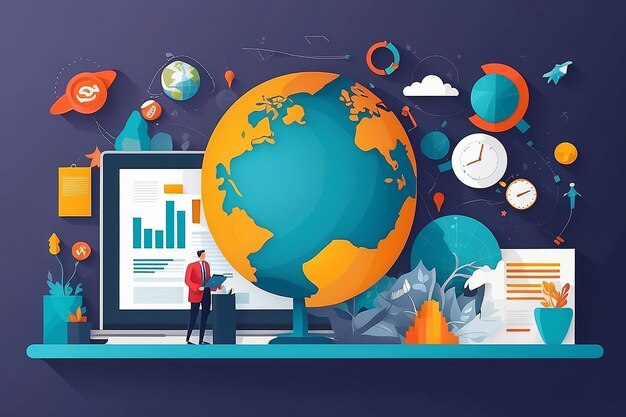How Information Technology Has Impacted the Economy – It has changed the world by increasing productivity, creating new industries, and driving globalization. One of the biggest impacts is in improving efficiency across all sectors. Automation and AI have streamlined processes, reduced costs, and improved accuracy in industries like manufacturing and logistics. For example, companies are using AI to optimize supply chains and automate repetitive tasks, resulting in faster production and lower operational costs.
The rise of the cloud has also allowed businesses to scale without heavy infrastructure investment. By using cloud services, companies can store and process huge amounts of data remotely, collaborate and real-time decision making.
Jobs in IT-related fields have improved, and software program development, records science, and cybersecurity are in high demand. However, IT-driven automation has additionally brought about activity displacement in some industries, specifically manufacturing and retail. Governments and corporations specialize in reskilling workers to evolve into the virtual economic system.
Information technology has not only changed but also enabled global trade. It has facilitated e-commerce and improved international logistics, allowing platforms like Amazon and Alibaba to empower small businesses to reach global markets. This has driven growth in both developed and developing countries, creating a more interconnected and dynamic global economy.

Productivity and Efficiency
Information technology has significantly improved efficiency across industries, providing a sense of reassurance about the future of business operations. It has accelerated processes and enhanced accuracy, allowing companies to achieve more with less.
Automation, powered by IT, has reduced human error and time spent on repetitive tasks. In manufacturing, robotics and AI machines now do tasks that used to require manual labor; overall output has increased. For example, McKinsey says automation could add 0.8% to 1.4% to global productivity annually.
Beyond automation, IT systems like ERP and CRM have streamlined internal processes and improved decision-making. These tools allow businesses to manage resources, track performance, and predict trends.
Cloud has also played a big role in productivity. By allowing businesses to store, access, and process data remotely, the cloud reduces infrastructure costs and enables real-time collaboration across locations. In short, IT in business has created faster, more accurate processes to do more with less.

Job Creation in Tech-Driven Sectors
Information technology has been a significant job creator, especially in the tech sector. Digital technologies have created a substantial demand for skilled professionals in software development, cybersecurity, data science, and IT infrastructure management. These roles are crucial as businesses increasingly rely on digital platforms and services to stay competitive, offering a promising future for the workforce.
For example, the product improvement industry is developing quickly. The US Department of Work Measurements predicts a 22% increment in programming engineer occupations from 2020 to 2030, which is quicker than any remaining occupations. This is because of the standard interest in new bundles, versatile arrangements, and contraption overhauls as associations adjust to changing generational patterns.
Cyber security is any other area where there may be big job growth. With the upward push of cyber threats, companies are investing heavily in protecting their virtual belongings, so there’s a huge demand for cyber protection specialists. According to a record through Cybersecurity Ventures, there might be as many as 3.Five million unfilled cybersecurity jobs by way of 2025.
Plus, the gig economy, enabled by IT platforms like Upwork and Fiverr, has opened up opportunities for freelance and contract-based work, so individuals with tech skills can offer services to clients worldwide. Overall, IT is a major job creator in the global economy.
Conclusion
In conclusion, information technology has changed the world economy by increasing productivity, creating new jobs and global trade. It has made industries more efficient with automation and cloud computing.
While technology has brought challenges like job displacement in some sectors, it has also created growth in tech fields like software development, cybersecurity, and data science.
It has also enabled globalization through e-commerce and supply chain management. As businesses and economies move into the digital age, the importance of IT will only grow, making it the engine of the future of work, trade, and economic growth.
Frequently Asked Questions (FAQ)
- What is the impact of information technology on the economy and society?
Information technology has significantly impacted both the economy and society by increasing productivity, enabling global trade, and fostering the creation of new industries. It has streamlined business processes, reduced costs, and improved accuracy in various sectors, such as manufacturing and logistics. On the societal level, IT has created new job opportunities in fields like software development and cybersecurity but has also led to job displacement due to automation.
- How has information technology impacted the economy?
Information technology has transformed the economy by driving efficiency, innovation, and global connectivity. Automation and AI have reduced operational costs while boosting productivity across industries. It has also revolutionized global trade, enabling e-commerce and improving logistics, allowing businesses, even small ones, to reach international markets easily.
- How does technology lead to economic development?
Technology fosters economic development by enhancing productivity, creating new industries, and improving communication and collaboration across borders. Cloud computing, automation, and data analytics allow businesses to operate more efficiently, making processes faster and less costly. Additionally, IT infrastructure supports job creation in tech-driven sectors, boosting overall economic growth.
- How does technology affect business and the economy?
Technology affects businesses by improving operational efficiency, reducing costs, and enhancing decision-making capabilities through tools like ERP and CRM systems. For the economy, IT promotes growth by creating jobs in tech sectors and enabling new business models, such as e-commerce, which contribute to a more globalized economy.
- What are the positive effects of information technology on the economy?
Positive effects of IT on the economy include increased productivity, cost reduction, and the creation of new jobs in high-demand fields such as data science, software development, and cybersecurity. It has also improved global trade through e-commerce and enabled businesses to operate on a larger scale without substantial infrastructure investments due to cloud technology.
- What are the negative effects of technology on the economy?
While IT has many benefits, it has also led to job displacement in sectors such as manufacturing and retail due to automation. Additionally, the digital divide creates unequal access to the opportunities that IT provides, and there are concerns about cybersecurity threats and data privacy in the increasingly tech-driven global economy.
- How has cloud computing affected business operations?
Cloud computing has revolutionized business operations by reducing the need for heavy infrastructure investments, enabling companies to store, access, and process data remotely. This allows real-time collaboration, faster decision-making, and scalability, contributing to increased productivity and reduced costs.
- How does automation affect global productivity?
Automation has a significant impact on global productivity by taking over repetitive tasks, reducing human error, and speeding up production processes. According to estimates, automation could add between 0.8% to 1.4% to global productivity annually, especially in industries like manufacturing, logistics, and customer service.


